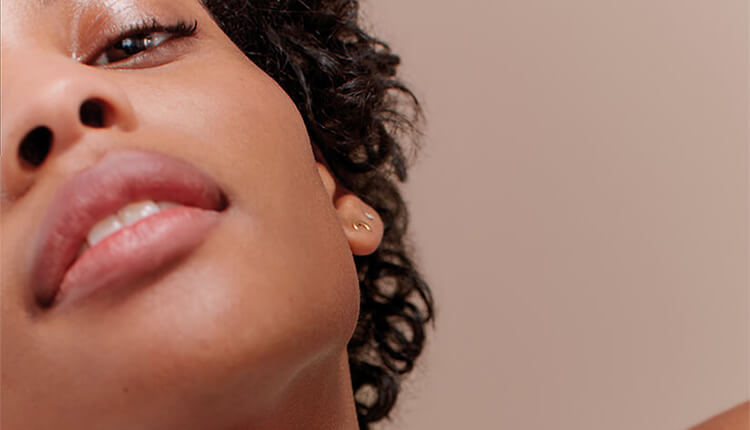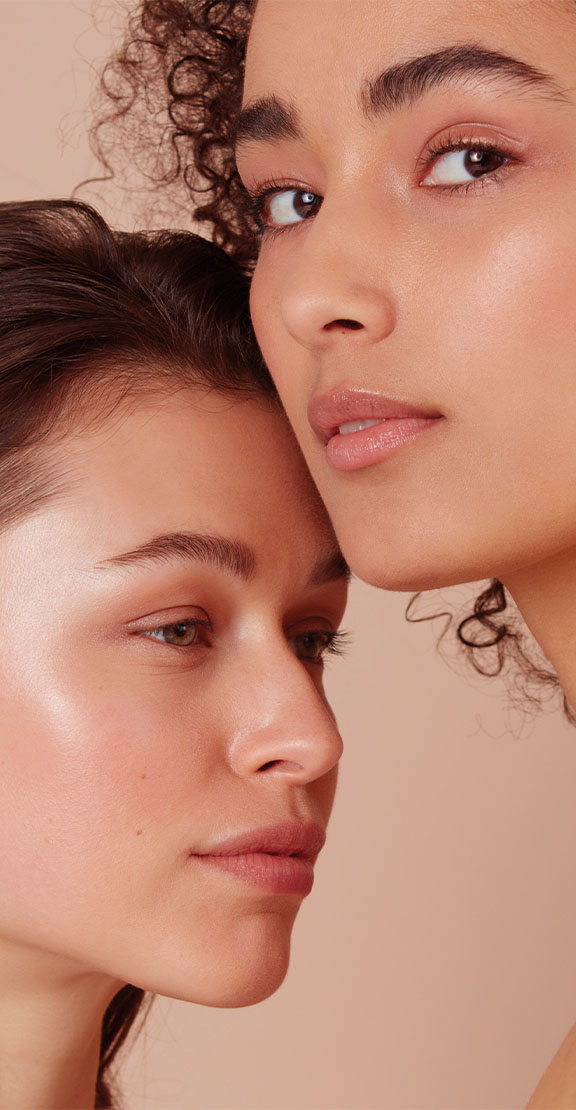Can You Mix Alchol And Water Based Makeup
Alcohol in skincare: the facts

With how much misleading data there is online in regards to booze in skincare, it'south easy to see why some people believe it actually isn't all that bad for skin. However, the research (and nosotros mean a lot of research) makes it perfectly clear: alcohol as a main ingredient in any skincare production is a problem.
We know we tin't convince anybody just we hope the latest enquiry, and, if you'll pardon the pun, sobering facts about alcohol-based products, will aid you put down the bottle if booze is lurking at the summit of the ingredient listing (we know, another pun, but we couldn't assistance ourselves).
But start we need to clarify what kind of alcohol we want you to avoid.
Tin alcohol ever be good for pare?
Surely, you lot think, there must be a good reason so many skincare companies include alcohol in their products. Right? Of class, there are a few reasons, simply in our experience, there are only two primary explanations. Firstly, alcohol can make a thick skincare production experience almost weightless, creating a deceptively pleasant aesthetic.
The second reason is that your skin is very good at keeping ingredients out. Peel-protective substances (think lipids, enzymes, and antioxidants) act similar little nightclub bouncers, keeping beneficial ingredients in your serums or other treatments from getting in. Alcohol helps ingredients like retinol and vitamin C penetrate into the skin more than effectively, but it does that by breaking down the skin's barrier – destroying the very substances that keep your skin healthy over the long term. Like a cowboy in a bar fight scene from an Old Western moving-picture show, alcohol is hurling retinol through the windows of your skin's barrier without a second idea.
If alcohol is bad, why is it used to clean wounds?
Nowadays, most medical professionals practice not utilize alcohol to clean wounds, then this is less of an issue than many call up. Not only is booze destructive, it'south also ineffective at sterilising wounded, open up skin. According to a report in Dermatology Clinics Journal, "…studies have demonstrated little benefit in [alcohol and topical antiseptics] disinfecting open wounds. Antiseptics are inactivated past organic thing such as clotted blood, serum, pus, and foreign bodies." Although alcohol disinfects skin (which is why the doctor or nurse oft swabs your skin before giving you lot a shot) applying alcohol to an open wound is incredibly harmful – physicians clean wounds with either sterile water, saline solution, or iodine.
The consumer's go-to site for medical communication, WedMD, states that, "rubbing booze to make clean an injury can actually harm the tissue and delay healing."
If booze evaporates, how damaging can information technology exist?
Nosotros understand the logic – if alcohol evaporates rapidly, it seems reasonable that the impairment will not exist and so severe. Unfortunately, enquiry reveals that this logic is simply wishful thinking. Booze immediately harms the skin and starts a chain reaction of harm that continues long later on it has evaporated.
One time alcohol is done raiding your peel's barrier like a SWAT squad, your skin isn't quite the aforementioned, and it won't be as good at protecting itself from farther harm. A 2003 study published in the Journal of Hospital Infection found that with regular exposure to alcohol-based products, cleansing becomes a damaging ordeal – skin is no longer able to keep water and cleansing agents from penetrating into it, thus further eroding the skin's barrier.
The good types of alcohol
In that location'due south a class of ingredients known as fatty alcohols, which are not the least fleck harmful for skin. Frequently confused with the bad alcohols, such as ethanol and alcohol denat, the fatty alcohols include, among others, cetyl alcohol and stearyl alcohol. Typically, fatty alcohols are used as emollients and thickeners in skincare products. Fatty alcohols are not irritating and, in fact, can be beneficial for dry skin. Equally far as your skin is concerned, fat alcohols are most as related to skin-damaging alcohol/ethanol equally a martini is to a loving cup of olive oil.
What is booze denat?
Alcohol denat (too known equally denatured booze) is part of a group of alcohols that have low-molecular weights and tin be drying and sensitising for skin.
Alcohol denat in skincare is bad news for skin. It's harsh nature can strip your skin of moisture and dry out your skin over time, all in all it is best avoided.
Alcohol'due south connection to oily skin and acne
Booze has ii benefits that could reasonably entreatment to someone with oily pare and/or acne. Alcohol can kill acne-causing bacteria on the surface of the skin, which is why some swear by booze-based anti-acne products to reduce their breakouts. Alcohol likewise chop-chop de-greases skin, and that instant gratification is attractive to those with super-oily complexions.
Research demonstrates that alcohol-based anti-acne products increase both irritation and dryness, and this tin can make it harder for those battling acne to stick to their routine. Not surprisingly, the aforementioned research noted that anti-acne products that contain milder alternatives to booze were better for peel. The irony of using alcohol-based treatments is that the damage they cause leads to an increase of acne-causing bacteria, and makes inflammation worse, the consequence of which are red marks that stay effectually for much longer than they would otherwise.
For those with oily skin, booze tin stimulate oil production at the base of the pore, so the immediate de-greasing effect is eventually counteracted by oily pare producing even more oil! Talk nearly spinning your wheels!
Alcohol and skin cells: For the science lovers
We must include the facts on how booze affects skin cells, because it'southward a complimentary-radical bonanza. Small amounts of alcohol applied to pare cells in lab settings (about 3% alcohol, but go along in mind skincare products comprise amounts ranging from 5% to sixty% or more) over the course of two days increased jail cell decease by 26%. It also destroyed the substances in cells that reduce inflammation and defend against free radicals; so, not only does alcohol crash your healthy-complexion party – it trashes the article of furniture, likewise! Worst skincare invitee e'er.
The damage to cells continues, and it's not pretty: Exposure to alcohol causes skin cells to literally self-destruct. Seriously – they just give up and become nail, and the longer the exposure to booze continues, the worse information technology gets for your pare cells. The aforementioned study establish that only ii days of exposure was dramatically more harmful than one day of exposure, and that was using an booze concentration of less than x%, which is much lower than what'south in many alcohol-based skincare products.
This enquiry clearly demonstrates the connection between complimentary-radical damage to peel cells and booze exposure. Interestingly, this is exceptionally similar to the costless-radical impairment that results from excessive consumption of alcohol in the short and long term. Cheers to that? We call up not!
Final thoughts
The research is clear: alcohol in skincare harms your pare's protective surface, depletes vital substances needed for healthy skin, and makes oily skin worse. To put it simply, information technology'south pro-ageing. Given the hundreds of skin-friendly alternatives that are available, it's a no-brainer to abstain from products front-loaded with the peel dissentious forms of alcohol.
The sole exception to booze employ on skin is in the case of hand sanitisers. Such products require at least 60% alcohol (ethanol) in order to most finer impale affliction-causing viruses and germs. Soap and water are preferred for hand hygiene throughout the day, but in the absence of user-friendly access to this method, using a mitt sanitiser is the next all-time thing. The exposure to alcohol isn't ideal, but unlike alcohol in facial skincare, booze-based paw sanitisers serve a necessary health-protecting purpose.

Do you want more skincare advice, tips and exclusive offers?
Sign up for our newsletter and get a Paula's Pick Member. Your benefits:
+ Welcome gift*
+ Exclusive deals*
+ Skincare communication
+ Altogether souvenir
* Only valid for new registrations. Valid on orders from € 25.
Related articles
- Silicone in skincare
Sources
- Biochmica et Biophysica Acta (BBA), book 1818, issue 5, May 2012, pages 1410–1419
- Skinmed, January-February 2011, pages 15–21
- Periodical of Investigative Dermatology Symposium Proceedings, August 2009, pages 20–24
- Clinical Dermatology, September-October 2004, pages 360–366
- Journal of Investigative Dermatology, book 120, 2003, pages 275–284
- Journal of Infirmary Infection, volume 55, upshot 4, December 2003, pages 239–245
- Dermatology, Jan 2003, pages 17–23
- Booze, volume 26, event 3, pages 179–190
- Dermatologic Clinics, volume sixteen, issue ane, January 1998, pages 25–47
- http://pubs.niaaa.nih.gov/publications/arh27-4/277-284.htm.
Customer Service
Need help with finding the correct production for you lot pare? Our client care team are skincare and product experts and can guide you to the best pare of your life.
Source: https://www.paulaschoice-eu.com/alcohol-in-skincare-the-facts
Posted by: wardacte1943.blogspot.com

0 Response to "Can You Mix Alchol And Water Based Makeup"
Post a Comment